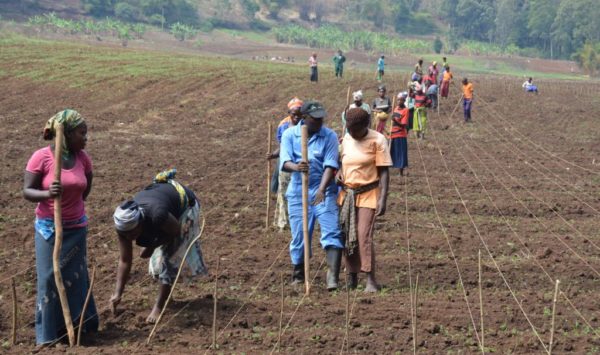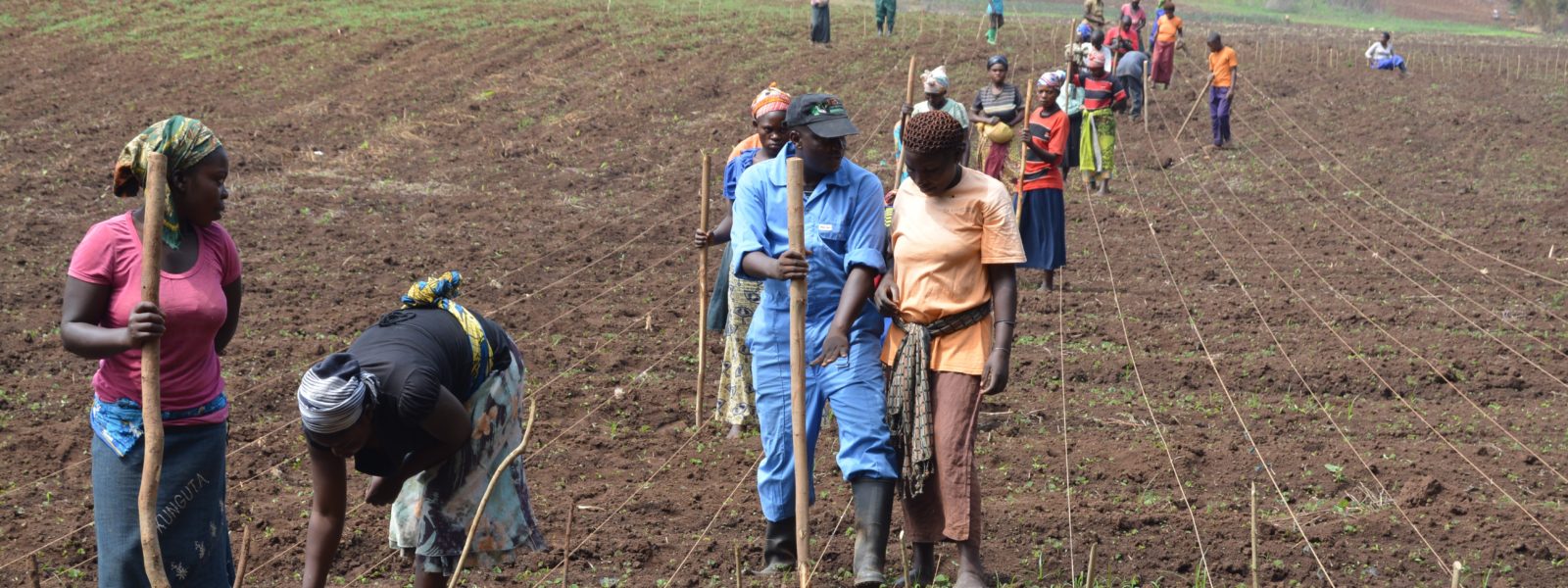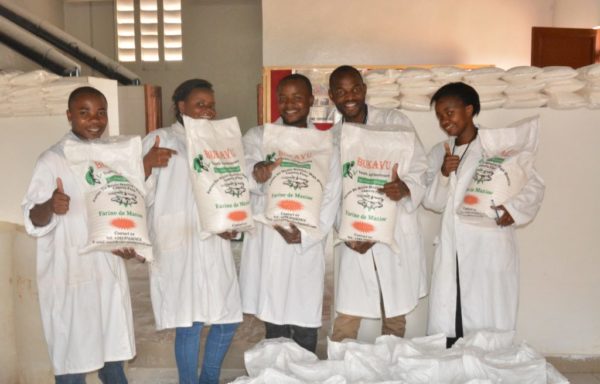Youth unemployment is a critical issue, with an estimated 73.4 million young people unemployed globally in 2015, according to a recent publication of the International Labor Organization (ILO). This rate of 13.1% was further predicted to rise in most regions by 2017.
Skills and jobs for youth feature prominently in the 2030 Agenda for Sustainable Development, with a dedicated SDG target (4.4) calling for substantial increases in the number of youth and adults who have relevant skills.
July 15, World Youth Skills Day, is a time to recognize the importance of supporting young peoples’ access to education and training, both of which are key determinants of success in the labor market. CGIAR recognizes the role and importance of these issues in its work, and the CGIAR Research Program on Roots, Tubers and Bananas (RTB) in particular is developing strategies to meet the pressing issue of youth unemployment.

Members of IKYA’s production team sowing maize at Murhesa site with rural workers. Photo N.Mulinganya/IITA
As the ILO’s ‘Global employment trends for youth 2015’ report states: “Strategies to promote agricultural diversification and expand the productive segments of the industrial and services sector are required to harness gains from structural changes and boost labor demand for youth in developing countries.” Too, there must be state support for modernizing agriculture (ibid).
Strategic efforts to increase young women’s and men’s engagement in profitable agribusiness enterprises feature as an important topic discussed by researchers in RTB’s research cluster CC5.3 on ‘Gender equity and youth employment’.
“Agricultural diversification, coupled with efforts to modernize agriculture, will create a more supportive environment for youth to engage in successful and more lucrative, thus more appealing, employment opportunities,” says Renee Bullock, a Gender Specialist with the International Institute of Tropical Agriculture (IITA) and member of CC5.3, who adds that research in the cluster has demonstrated that the challenges facing young women and men often differ.
Together with the CGIAR Research Program on Integrated Systems for the Humid Tropics, the CC5.3 team has been involved in studies under the GENNOVATE initiative, which addresses the question of how gender norms and agency influence men, women and youth to adopt innovation in agriculture and natural resource management.
A key finding from GENNOVATE’s recent work concluded that: “Young men and women’s interest in agriculture can be increased by direct application of knowledge and skills gained through formal education, and by recognition of the knowledge-intensive nature of many aspects of agriculture. If agriculture is viewed as a low status occupation appropriate for those with limited formal education, it will be stigmatized and will not appeal to youth.”
CC5.3 will consider these elements as the team works to develop a Youth Strategy that will guide research and RTB’s vision for addressing youth issues across CGIAR centers. Among the critical research issues discussed in a recent meeting was the gap in understanding young women and men’s aspirations, within and beyond agriculture, which was highlighted as a key research area to better position RTB to tackle youth unemployment. The strategy will guide key research objectives from which training needs will be identified.
Several CGIAR institutions have already begun to address the issue. For example, RTB partner IITA has provided learning and training opportunities through its Youth Agripreneur Program. Youth Agripeneurs participate in agribusiness incubations, provide training and mentoring to other youth. Within an 18-month timeline, departing interns are expected to develop winning business plans and start their own agribusinesses (other options include rural enterprise and improved profession position to enter job market).
Among the projects is the ‘Roots and Tubers Production Enterprise & Bananas and Plantains Enterprise’, in which high quality, newly developed cassava varieties are multiplied by farmers. Too, in Bukavu, Democratic Republic of Congo, IITA Kalambo Youth Agripeneurs (IKYA) has developed strong rural and urban linkages that support smallholder income generation. Through the Support to Agricultural Research for Development of Strategic Crops in Africa project, IKYA purchases raw and processed cassava roots, which they then process on site to make High Quality Cassava Flour that is sold in Bukavu supermarkets. In addition, a current research effort to understand mindset change and to critically assess the IKYA experience is underway.
RTB will build upon the diverse experiences of stakeholders and partners that include national agricultural research systems, farmers, youth, and CGIAR scientists, to be an exemplar leader in addressing key challenges faced by young women and men in developing countries. The Youth Strategy will guide the ways forward to identify, create and continue to strengthen youth opportunities by putting research to work through sound development practice and evidence based policy recommendations.
By Renee Bullock and Holly Holmes

